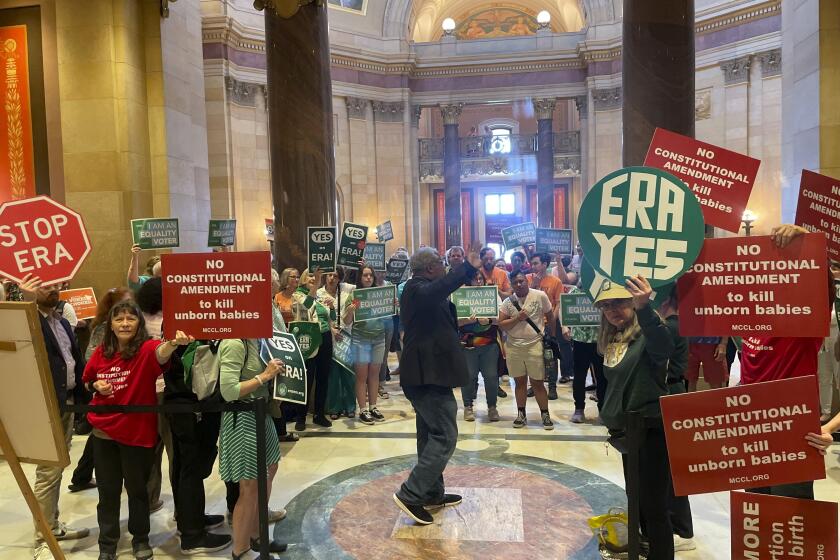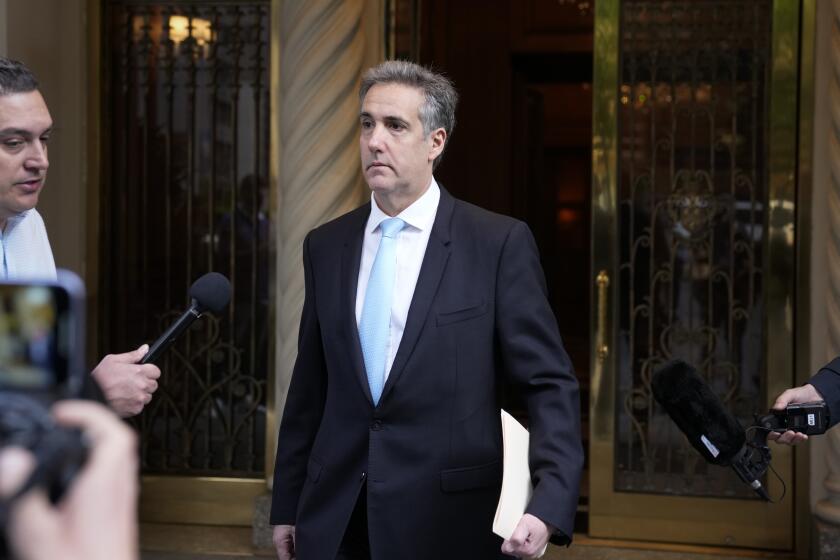Police Kept Infiltrator in Klan Despite Political Race
Assistant Police Chief Bob Burgreen testified Tuesday that he and other top officials of the San Diego Police Department voted to keep Doug Seymour in a Ku Klux Klan undercover detail despite the fact that the head of the white supremacy group was a candidate for Congress.
That controversial decision by the police commanders set the stage for later accusations by Klan leader Tom Metzger that San Diego police were violating federal law by spying on his political campaign.
It also triggered the lawsuit now being tried in San Diego Superior Court, in which Seymour contends that police coerced him into staying too long in the difficult undercover assignment and then disavowed their relationship with him after Metzger threatened to sue the department.
More Testimony
Also testifying Tuesday in the 3-week-old trial were two fired San Diego police sergeants, both of whom said Seymour’s police supervisors considered him merely a “snitch” rather than a police reserve officer who was recruited for the Klan assignment.
Burgreen said police became uncomfortable with Seymour inside the Klan once Metzger filed for Congress in 1980. The Klan leader won the Democratic Party primary, but then lost in the general election.
Burgreen said he and the deputy chiefs, along with Chief Bill Kolender, met to discuss whether to extract Seymour from the detail or to keep him under cover. “The discussion covered all aspects, both for the difficulty of the person in it and for the ramifications of the Police Department,” Burgreen said.
He said that, after much debate and a vote among the chiefs, the decision was made to keep Seymour under cover.
‘Ultimate Decision’
“The ultimate decision rested with the chief of police,” Burgreen said. “His style is to elicit input from his top staff and consider that input. He has the ultimate responsibility.
“And it had his approval.”
Former Sgt. Bob Hannibal testified that, although Seymour was in fact a police reserve officer who was encouraged to take the Klan assignment, his supervisors considered him differently. He said the supervisors referred to Seymour as a drug offender whom they were “putting the twist on” to obtain information from under threat of arrest.
“I understood from them that he was once a reserve who got in trouble with drugs and was working the beef off by infiltrating the Klan,” Hannibal said.
He also testified that many police officers working in criminal intelligence were encouraged to take drugs during undercover assignments if it would prevent criminals from becoming suspicious of their true identities. He said police supervisors told officers that, if they were ever prosecuted, their superiors would testify that the drugs were actually just simulated.
In earlier testimony in the Seymour lawsuit, Seymour has said he used cocaine at Klan functions.
Fired From Force
Hannibal also testified that he was fired from the department and pleaded guilty to obstruction of justice.
He eventually spent five months in prison for his role in attempting to stop a police investigation into a prostitution ring he allegedly operated. Under a plea-bargain arrangement, his conviction was reduced to a misdemeanor, then expunged from the record after he completed probation, he said.
Another witness for Seymour, former Sgt. Rod Quigley, testified that Seymour’s superiors considered him a police informant. “I realized they were viewing him as a snitch,” Quigley said.
He also testified that he and other officers entered into complicated real estate deals with Seymour that fell through when Seymour was unable to devote his full attention to the projects because of his work on the Klan assignment.
Under cross-examination, Quigley said he was eventually fired from the department for a series of infractions, including use of excessive force. He declined to say he was testifying on behalf of Seymour because he was bitter against the department and added: “I think Doug has spent years chasing a foolish case.”
More to Read
Get the L.A. Times Politics newsletter
Deeply reported insights into legislation, politics and policy from Sacramento, Washington and beyond. In your inbox three times per week.
You may occasionally receive promotional content from the Los Angeles Times.







